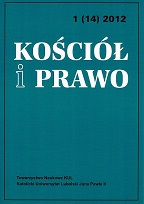Pious wills as a means of acquisition of the temporal goods in the Code of Canon Law and the particular Polish law
Pobożne zapisy jako sposób pozyskiwania dóbr doczesnych w Kodeksie Prawa Kanonicznego z 1983 r. i w partykularnym prawie polskim
Author(s): Agata WarmuzSubject(s): Law, Constitution, Jurisprudence
Published by: Towarzystwo Naukowe KUL & Katolicki Uniwersytet Lubelski Jana Pawła II
Keywords: pious wills; Church property rights; donation for ecclesiastical juridic persons; acquisition of material goods by the Church; pobożne zapisy; prawo majątkowe Kościoła; darowizny na rzecz kościelnych osób prawnych
Summary/Abstract: The Catholic Church as a community operating in the world needs material resources to be able to fulfill its mission. The right to own property is inherent right of the Church and includes the acquire, hold, management and alienating goods. One way of obtaining material resources identified by the Code of Canon Law are pious wills. The article analyzes the provisions of pious wills contained in the Code Of Canon Law. Also have been discussed statutes of selected polish diocesan synods, which provide for the possibilities of adopting pious wills, ways of documenting and the obligation to comply with government regulations.
Journal: Kościół i Prawo
- Issue Year: 1/2012
- Issue No: 1 (14)
- Page Range: 153-166
- Page Count: 14
- Language: Polish

